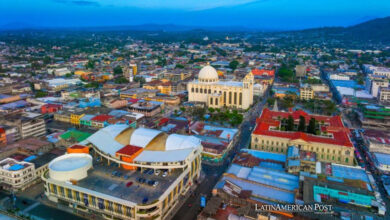El Salvador's Party-Funding Move Erodes Democracy And Freedoms

El Salvador’s plan to strip political parties of public funding under President Nayib Bukele is a diversion from rising controversies. Eliminating state support for campaigns weakens democracy, fosters undue private influence, and cements a single-party grip on power.
Politically Motivated Elimination Of State Funding
President Nayib Bukele’s push to abolish public financing for political parties in El Salvador has triggered alarm across the country’s political landscape. Though framed as a cost-saving measure that reduces corruption, the real motives appear far more political. Bukele has seen a recent dip in approval tied to controversial policy reversals—chiefly allowing metallic mining after years of prohibition—and critics label his funding proposal a “smoke screen” to recapture public favor. Coupled with a wave of other reforms that centralize authority, this new effort to remove state resources from party coffers stands to tip the electoral field heavily in favor of Bukele’s faction, Nuevas Ideas (NI).
Despite its anti-establishment veneer, Bukele’s movement rests on a formidable political machine. By dismantling the public financing system, other parties—already struggling for private donations—will be hobbled when competing in elections. The impetus behind enshrining or abolishing public funding in national constitutions is to maintain at least a degree of balance: smaller or emergent groups lack the wealthy backers or media presence that well-connected figures enjoy. El Salvador’s earlier reforms acknowledged these matters or established a “deuda política” system to balance inequalities. A party that fails to align with those in power could become irrelevant in elections if these support mechanisms disappear.
Yet Bukele’s advocates claim a moral high ground, insisting that public money should never subsidize “discredited” or “inefficient” parties that fail to earn broad-based trust. It’s an appealing argument in a region where corruption is rampant, and taxpayers resent propping up the exact figures who historically delivered little tangible progress. However, such rhetoric overlooks the nuanced role of state funding: to ensure pluralism in a democracy so that all contenders—no matter how small or critical of the status quo—can present themselves on a level playing field. Without state-backed financing, private donors, including powerful business interests or illicit groups, could hold sway, amplifying the risk of pay-to-play politics and deepening the infiltration of organized crime into government.
The scenario grows more concerning given that, to remove “deuda política,” Bukele is prepared to enact a constitutional reform. He controls the Assembly and successfully pushes a constitutional amendment to speed up future changes. This move weakens the law, which requires two legislative votes in different terms before any amendment becomes active. The supermajority supporting Bukele can speed up constitutional changes and skip the limits that would slow down or soften such a significant change. The quick modification of basic laws shows their readiness to alter rules fast, which leaves very few options for those who oppose them.
Simultaneously, El Salvador’s democracy has taken other hits: legislative reforms in 2023 drastically cut the number of lawmakers from 84 to 60 and reduced the nation’s municipalities from 262 to 44, mainly benefitting Nuevas Ideas. Critics see a pattern: the administration systematically uses institutional changes to ensure dominance in every governance layer, from the legislature to local councils. Now, eliminating direct public funding for parties is another step that cements the path to single-party control.
That reality fosters deep unease among observers. Although an injection of public money in politics can lead to inefficiencies or potential abuse, the alternative—private or foreign interests picking which parties can survive—seems even more damaging. Worse yet, constitutional rules’ simultaneous “reshuffling” signals a creeping authoritarian style disguised by populist slogans promising budgetary responsibility and anticorruption toughness. A democracy depends on fair competition between parties, yet removing campaign funding from opposition groups destroys their ability to compete with the ruling party.
Hidden Motivations Behind the Reform
President Bukele’s opponents point out that his latest actions coincide with rising public discontent. His decision to reverse the metallic mining ban has caused outrage because citizens dislike the risks. The population fears environmental damage, water pollution, or big companies’ excessive use of resources. Exploiting gold, silver, or other metals can degrade farmland and local aquifers, raising immediate health concerns about rural communities. Opposing voices characterize the pivot as allowing mining as an example of collusion with large investors or foreign-based mining firms.
Recent surveys, including one from the Francisco Gavidia University, show that Bukele’s approval ratings are dropping somewhat, albeit still high, compared to many world leaders. Even a slight slip, however, could alarm an administration unaccustomed to anything but glowing popularity. The impetus to propose sensational reforms—like abolishing “deuda política”—can be read as a maneuver to distract from the negative press and quell potential protests. The president effectively changes the narrative by turning the spotlight toward the “privileges” of political parties. The old parties, governed for decades under FMLN or ARENA, remain unpopular, making them easy targets.
The timing stands out clearly. A hot-button issue in politics can redirect public attention. People angry about damage to nature may turn against the corrupt parties that steal millions from taxpayers. A message of “saving taxpayer money” really connects with regular citizens. Most parts of Central America face limited resources or widespread corruption, so attacks on “wasteful public funding” often get support. But such quick fixes don’t solve the actual problems underneath. True democracy needs a space where different voices can speak up next to each other on equal terms.
Moreover, the synergy between the official party and allied groups underscores that once “deuda política” disappears, Nuevas Ideas still has alternative means to remain flush with resources. Private donors—domestic or international—see Bukele’s party as a winning bet, likely securing their influence. Opponents with fewer corporate backers or diaspora connections cannot match that. In effect, any incipient grassroots movement lacking wealthy patrons is summarily disadvantaged, possibly dooming future attempts to create new political forces that reflect local concerns.
Even if, hypothetically, the aim of saving taxpayer money was genuine, the cost-saving might be negligible compared to broader national expenses. In the big scheme, funds allocated to public financing rarely overshadow massive government outlays on infrastructure, security, or debt servicing. If the measure were indeed about belt-tightening, the government might find more substantial programs to cut. Instead, seizing upon the “deuda política” narrative to mobilize public support aligns well with populist instincts that demonize the old political class but ignore the complexities that gave rise to the funding mechanism in the first place.
Threatening Multiparty Democracy
The removal of state support restricts smaller parties along with traditional ones. This damages a basic principle that democracy works best when citizens back different viewpoints or new candidates. Some people claim that parties should fund themselves through membership fees or private contributions. But such changes help specific groups that connect to business leaders, rich donors as well as foreign interests. Thus, those donors can impose agendas behind closed doors in a climate of limited transparency.
Historically, El Salvador’s two major parties, the left-wing FMLN and the right-wing ARENA, were marred by scandal, complacency, or policy failures. Their reputations plummeted, opening a lane for Bukele’s rise. Many voters welcomed a fresh face promising to rid the country of cyclical corruption. But ironically, Bukele creates new reforms that match the exact actions he once attacked. He does not focus on building a genuine multiparty system for fair competition. He clears a path toward total control that could last even if the economy or social conditions become terrible.
If official public financing is abolished, the cost of mounting a nationwide campaign—paying for advertisements, organizing rallies, training poll watchers—will escalate beyond most parties’ capacity. Historically, “deuda política” helped offset that burden. Yes, it might also have financed questionable campaigns, but in principle, it allowed new entrants a chance to expand. Absent those funds, nepotism, and nepotistic networks fill the void. Parties may transform into personalistic clubs reliant on a single magnate or influencer.
Additionally, the synergy of legislative reforms—fewer seats in Congress, far fewer municipalities—already foster an environment where incumbents hold tremendous advantages. With fewer local offices, only the largest, best-funded organizations can realistically attempt to staff or campaign in each region. The inevitable consolidation means that if you want your grievances heard or your region’s needs addressed, you might feel compelled to side with the party in power. The pattern intimidates opposition over time because local officials or residents fear punishment when they oppose the leading group.
A system with just one party has caused a decline throughout history. The ruling group is not motivated to change or listen to opponents, making them lazy or controlling. The fact that Bukele is already swiftly pushing constitutional changes suggests an appetite for top-down decision-making. The old parties are discredited mainly, so the public might not rush to defend them. But in a few years, if discontent grows over social policy or mining expansions, people could discover no meaningful alternative left to hold the government to account.
The core part of democracy extends far beyond just elections. A genuine democratic system needs real competition, active debate, and clear limits on what leaders do. Through the removal of state funding, the administration aims to cripple the essential support rival organizations need to stay active. Denying them resources fosters a scenario akin to an athletic contest where one team has all the training and equipment while the other runs barefoot. The result is a foregone conclusion, not an authentic expression of people’s will.
Stepping Back From A Partisan Future
The critics who question the end of “deuda política” argue that it weakens El Salvador’s democratic standards. A better path would fix the system through strict oversight or clear rules instead of removing all funds. The state could reduce money for proven wrongdoing but keep essential support for valid parties. This plan would target problems yet protect the core belief that each viewpoint needs fair access.
Focusing on private donation limits or complete source disclosure would effectively cut wrongdoing. These rules would prevent wealthy donors ‒ local power players or outside interests ‒ from gaining excess influence. Standards for equal media time or public debates could offset financial advantages. But Bukele opted to stop state funding, which allows private or hidden sources to step in.
The president’s backers claim this decision shows his readiness to face established parties head-on. They view it as a direct step that appeals to citizens tired of funding years of poor governance. But without essential safeguards for different views, this shift aids those already at the top. Public options may shrink if opposition groups become too small. The immediate effects could make Bukele appear successful or draw focus away from concerns about mining expansion and family preference claims. But, long-term, it leads to a precarious outcome: a polity in which Nuevas Ideas stands nearly unopposed while alternative voices languish or are forced underground.
For many, this direction is reminiscent of the region’s darker legacies: single-party regimes, personality cults, or abrupt overrides of constitutional checks. The worry is that these changes—shrinking the legislature, consolidating municipalities, quashing public financing—together form the scaffolding for a monolithic system. If the people disapprove of specific policies in the future, the lack of competition could hamper their ability to spark genuine change.
Ironically, if “deuda política” is abolished in haste, the measure might backfire if public frustration continues to build. No matter how strong its hold on institutions, any government that fails to deliver results eventually faces pushback. The same wave that catapulted Bukele to power might one day turn against his party if living conditions, employment, or freedoms deteriorate. A transition from discontent to political turnover could turn disorderly with the dismantled checks and balances.
The core reason for state funding is that it serves as a counterweight to the power of wealthy interests. Reforms gave parties essential resources to limit shady donors’ sway and decrease criminal or business groups’ infiltration. This setup allows regular citizens to create political organizations. Removing that structure does not solve corruption—it only displaces the problem, inviting large-scale private financing that works in the shadows, effectively making politics an exclusive domain of those with deep pockets or state backing.
Thus, if El Salvador wants a robust, evolving democracy, the path forward should revolve around transparent oversight of public funds, sensible distribution formulas that reflect genuine voter support, and rules punishing proven misuse. Sweeping the entire concept away does more harm than good. Regardless of Bukele’s popularity or the rhetorical flourish used to promote this measure, dismantling “deuda política” spells a step toward hegemonic rule. Citizens must not let frustration with old party elites close their eyes to the threats of one-party ascendancy.
Without robust competition, democracy becomes a hollow façade, reliant on a single narrative set by those in power. El Salvador’s future demands more than an easy fix that ironically cements the incumbent’s dominance. Suppose the country’s institutions are to remain viable. In that case, leaders need to consider preserving genuine pluralism—even if it means tolerating the presence of many parties that do not attract big donors. Real reform should include accountability, legal channels for investigating campaign finance, and a balanced distribution of resources, not an abrupt slash that leaves the ruling party unchallenged.
Also Read: Colombia Deserves Leadership and Solutions, Not Petro’s Public Feuds
Eliminating public financing may yield short-term applause from those outraged by past corruption. But in the grand scheme, democracy is best served when competing voices can run campaigns without desperately groveling for secret contributions. More than ever, that principle should guide El Salvador’s approach, ensuring the government invests in the electorate’s capacity to choose among multiple visions. Otherwise, the day may come when people realize that by eradicating state support, they unwittingly granted near-perpetual reign to a single faction. If so, “deuda política” might be gone, but so is the essence of a free and fair electoral process.





